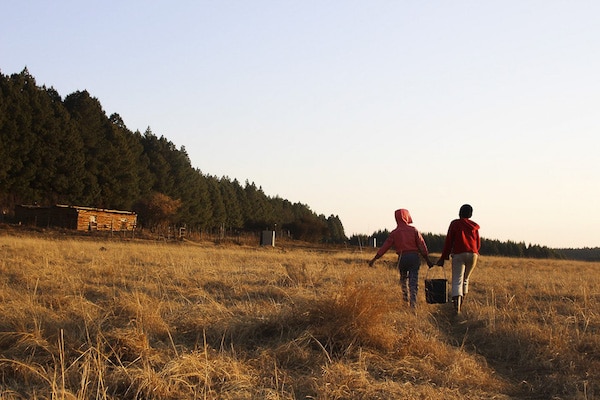Introduction
Growing up on a farm in Nyarha, in the Eastern Cape province of South Africa, I experienced the best childhood.1 There are several reasons for this. The first was the innocence of childhood, just being a little girl running freely and playing with oonopopi (‘dolls’), iraysisi (‘racing’), undize (‘hide and seek’), upuca (‘the stones game’), and ugqaphsi (‘jumping rope’). The sense of community, freedom, and interdependence in communal living was another joy. My parents could send me to a neighbouring homestead without any fear for my safety. My mother would often send me to the neighbour’s house to ask for igaqa le beef stock (‘a cube of beef stock’) to season our food if she didn’t have any, or intwana ye swekile (‘some sugar’) if she ran out.
The only time when I felt the absence of that freedom and the sense of belonging begin to dwindle was at the sight of the white farm owner. Instantly, I became overwhelmed by a great fear. The fear was both a learned and taught behaviour; we were taught that it was a form of respect. While taking instructions from the farmer, my grandfather would be deferential, bowing his head to avoid eye contact. When my father heard the sound of the farmer’s motorcycle approaching, he would quickly hide his beer.
The relationship I have described between the farm owner and farmworkers and dwellers is part of the social fabric of the farm. Farms are not just units of production; they ‘are structured by paternalist discourses–practices that weave power relations into the very fabric of social identity and daily life’.2 As a form of control and display of his power, the white farm owner needed to get the sense that you feared him. Appearing fearless was viewed as a sign of disrespect, especially if it meant that you were ready to question anything that the farm owner said or did.
As a child, I found it peculiar when my father used to tell me that all of the vast farmland around eNyarha belonged to white people. None of the Black people had any land. As an adult, I was enraged to learn that five generations of my family had worked for the same family, but we had no claim to that land whatsoever. I questioned why my family’s decades of labour bore fruit only for the wealthy white landowners and their descendants. I could not reconcile the story of five generations of hard labour with the life we were living: a life of poverty.
The labour relations on South African farms continue to maintain race, gender, and class inequalities as a central character of work and life. Large-scale commercial farmers, like all other capitalists, maintain cycles of servitude which result in the generational poverty of their workers and engage in exploitative labour practices such as coercing employees into long hours of manual labour and paying them slave wages. As workers spend most of their time working, they rarely have the time, physical strength, or mental energy to practice other methods of subsistence, undertake recreational activities, or travel away from the farm. Both the land and the workers themselves are sites of exploitation. Farmworkers are paid poorly: as of 2022, their salaries range from R2000–R6000 (about $136–$408) per month. Their paltry wages are not enough to sustain them, forcing them into a life of minimal subsistence, and they often complain that they can’t afford to purchase food or pay for their children’s education.
Many farmworkers and intellectuals alike have pointed to the unpaid, undervalued, and often invisible labour of reproducing and sustaining life, such as the birthing and rearing of children, maintaining the household, caring for the sick, cooking, cleaning, and so on, also known as reproductive labour. This labour is at the base of our economic system, as it reproduces not only our existence as a species and society but also provides workers for the capitalist class. In the words of Susan Ferguson:
… our understanding of capitalism is incomplete if we treat it simply as an economic system involving workers and owners and fail to examine the ways in which the wider social reproduction of the system–that is, the daily and generational reproductive labour that occurs in households, in schools, in hospitals, in prisons and so on–sustains the drive for accumulation.3
In the context of farms, workers’ meagre incomes hinder social reproduction for their families. Under this system, in which farmworkers are tied to the land yet retain no ownership over it for several generations, their employment encompasses all aspects of their world: to work the land, to live on the land, to nurture and sustain the land, to raise children on the land, to bury family and loved ones on the land, to have a connection with the land, to love the land, and to call the land home, but never to own the land.
Bab’Kubheka, a 71-year-old retired farmworker and farm dweller in Newcastle, KwaZulu-Natal, explains how his parents’ social class has impacted his life and the lives of his siblings. He says:
We were crippled by the system. Our fathers were labour tenants who had no money to send us to school.4 They were also told how many cows they could keep and where to keep them. They did not get any renumeration, hence they are known as labour tenants … we could not be educated at the tertiary level because our parents had no money. We lived on the food they used to grow. We did not sell anything. They woke up to go and work for white people without any remuneration. Today we have a problem that our people–Black people–still do not have land.5
Bab’Kubheka’s account exemplifies Walter Rodney’s assertion that ‘To mark time or even to move slowly while others leap ahead is virtually equivalent to going backward’.6 Poverty transfers and reproduces across generations.7
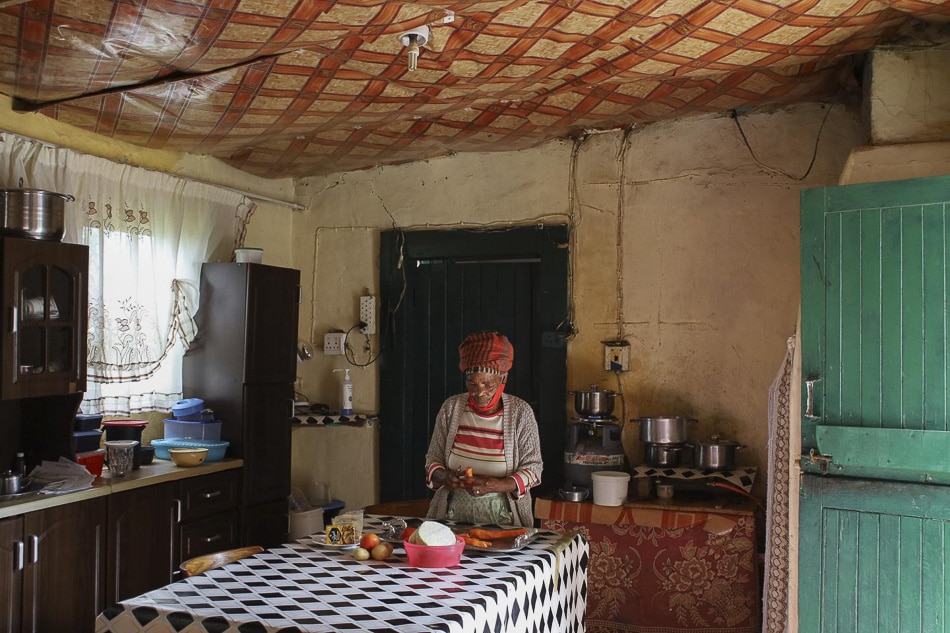
In addition to farm work, women like Nozibonelo Mavis Dayi are largely responsible for the social reproduction of the family in the form of unpaid care work in the household, 21 March 2021. (Photo: New Frame / Bonile Bam)
About This Dossier
Departing from the assumptions that have shaped the way that the land question is framed as an elite nationalist project in South Africa, this dossier focuses on farmworkers as key contributors to the land debate. It makes two main arguments. The first is that one of the main reasons for the enduring generational poverty of Black farmworkers is the exploitation of their labour. The farm, like many other capitalist endeavours, relies on the devaluation of the labour of Black people. Landowners treat Black people’s labour as cheap and maintain a kind of serfdom in which landless workers are tied to the owner’s land and compelled to be loyal. Threats of job loss and evictions are a few ways that farm owners extract loyalty, which has serious implications for the farmworkers: to question anything is to risk everything.
Secondly, this dossier argues that those who work the land deserve to be its primary beneficiaries, but, instead, they have been excluded from the profits and stability of owning land for generations. They have also largely been made invisible in labour statistics and excluded from the land debate and in national discussions on land redistribution policy. Understanding their perspectives is important for advancing a land reform programme that benefits those who work the land, which is why this dossier centres their contributions to the land debate, and why Tricontinental: Institute for Social Research conducted interviews with farmworkers from the South African provinces of the Eastern Cape, KwaZulu-Natal, Northern Cape, and Western Cape for this dossier.
The land question in South Africa has several dimensions, including the role of white-owned farms, traditional authority in the former Bantustans, and the urban land question. This dossier is devoted the former.
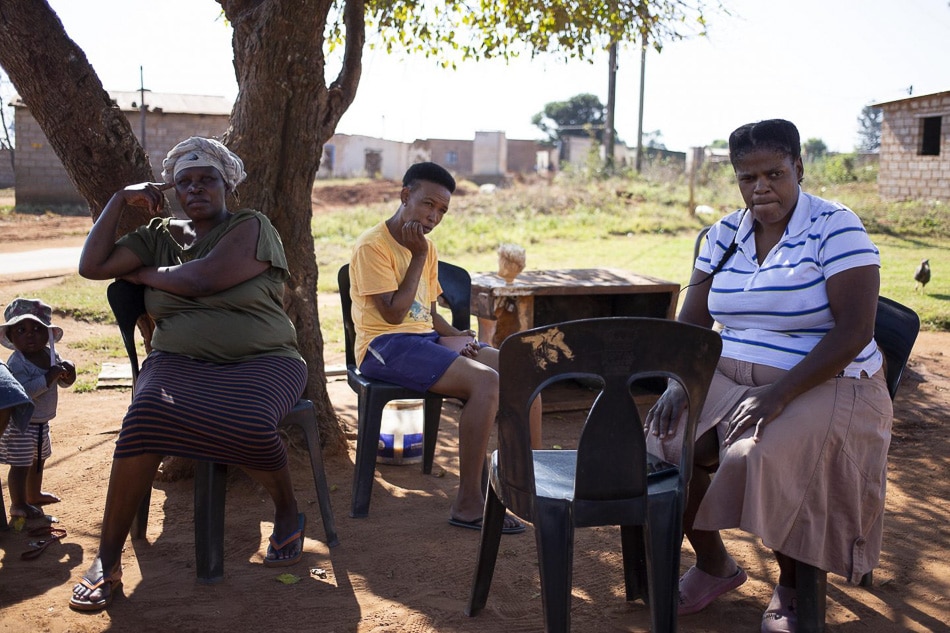
Women farmworkers face additional inequities in land distribution and working conditions. Former labourers Freeda Mkhabela, Lucia Foster, and Gugu Ngubane (from left to right) are among the activists struggling against landlessness as well as poor pay and working conditions, and for better treatment of farmworkers, 26 May 2021. (Photo: New Frame / Mlungisi Mbele)
Our History Has Become Our Present
‘Time does not pass or progress; it accumulates, even in the work of forgetting or ending, even in the immense labour it takes to surrender what-has-been, or to make reparation on it, or to address its ill effects’.8
– Ian Baucom
Writing about the plight of farmworkers in South Africa in 1990, historian Wendy Davies showed how one can track land distribution along racial lines as well as the devaluation of the labour of Black people through history. Davies detailed how Black pastoralist and farming communities were dispossessed of land by sequential waves of white settlers from the mid-seventeenth century onwards. White settlers gained ‘ownership’ of new territory by winning frontier wars against Black chieftainships and kingdoms. Through a process of drawing up bogus treaties and deeds of sale, they ensured that the terms were vastly in their favour. Although there was significant resistance to their advance, the white settlers’ use of violence enabled the success of their occupations.9
British and Dutch (‘Boer’) settlers in South Africa required labour for their farms, plantations, and mines on the land that they had appropriated from Black South Africans.10 In Davies’ words, White farmers emphasised that ‘only if blacks toiled for the white man could their presence be tolerated’.11 The British imperialist Cecil John Rhodes displayed this view in his 1894 speech to the Cape House Parliament, pronouncing that ‘it must be brought home to them [Blacks] that in the future, nine-tenths of them will have to spend their lives in daily labour, in physical work, in manual labour’.[12] This process was carried out by coercing Black people to work for white farmers by taking their land away from them, by destroying their livelihoods, and by introducing taxation in order to drive them into the labour economy.13
Davies explains that, ‘when white farmers had gained control of virtually all the land, Black farmers began to enter into sharecropping or tenancy arrangements with their white “owners”’.14 Sharecropping meant that those who worked the land shared a portion (typically 50 per cent) of their crop with the ‘owner’ in return for land access.15 Farms were and still are home to labour tenants, another group that provides free labour to farm owners in return for land access, typically by working for free for six months of the year. There are also Black farm dwellers who reside with their families on farmland that they own, some of whom are employed in farm work on a part-time or full-time basis.16
This process of accumulation by dispossession has had an enormous impact on social and class formations across the African continent. As Issa G. Shivji explains, ‘the disparity we see between workers and owners, between rural and urban areas and between colonised and metropolitan countries is the result of a process of unequal exchange that goes back several centuries’.17
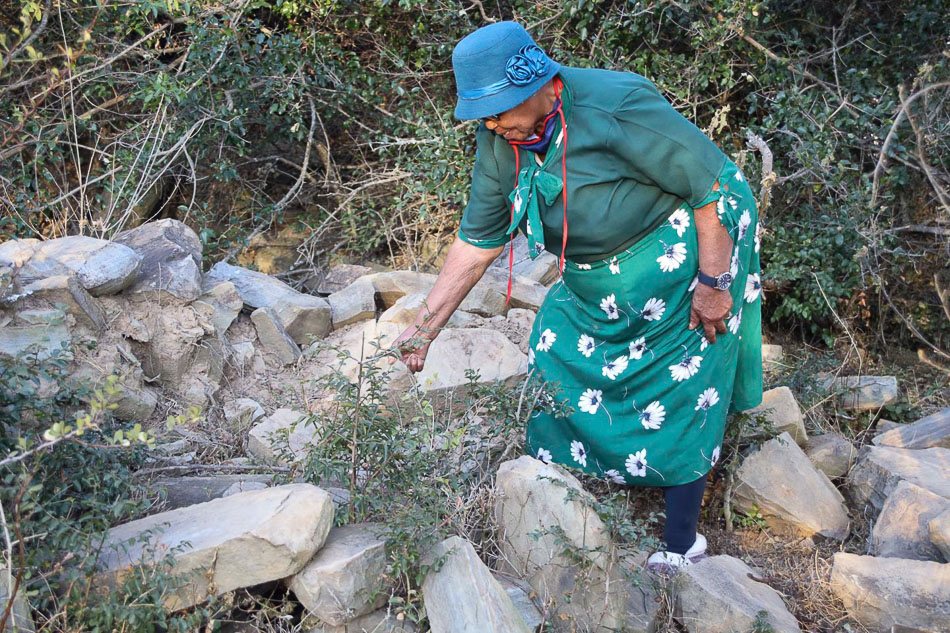
Elderly and retired farm dwellers and farmworkers carry memories of their ancestors through oral histories. Nomabhaso Skenjana points to the site where her family’s graves had been located from the 1880s until they were destroyed during apartheid, when the farm was seized by white people, 4 August 2021. (Photo: New Frame / Bonile Bam)
Land Distribution by Race and Gender
The agricultural sector in South Africa is a key driver of economic growth; in the final quarter of 2020, the agricultural GDP grew by 13.1 per cent, and, in the same calendar year, the country’s agricultural exports were worth R151.7 billion ($10.2 billion).18 However, one of the problems with the current distribution of land in South Africa is that farmworkers and farm dwellers are excluded from the wealth produced by agricultural exploits. In 2017, the total land used in commercial agriculture accounted for 37.9 per cent of the total land area of South Africa.19 As seen in table 1, most agricultural land is still privately owned by white male farmers, though white people make up less than 10 per cent of the population. Meanwhile, individual men own 72 per cent of the total farms and agricultural holdings with individual owners, compared to women, who own only 13 per cent.20 However, these statistics only record landowners and not those who work land, who are made invisible, thereby erasing the reality on the ground that there are two players in agricultural production: the farm owner and the farmworker.
Table 1: Individual farm and agricultural
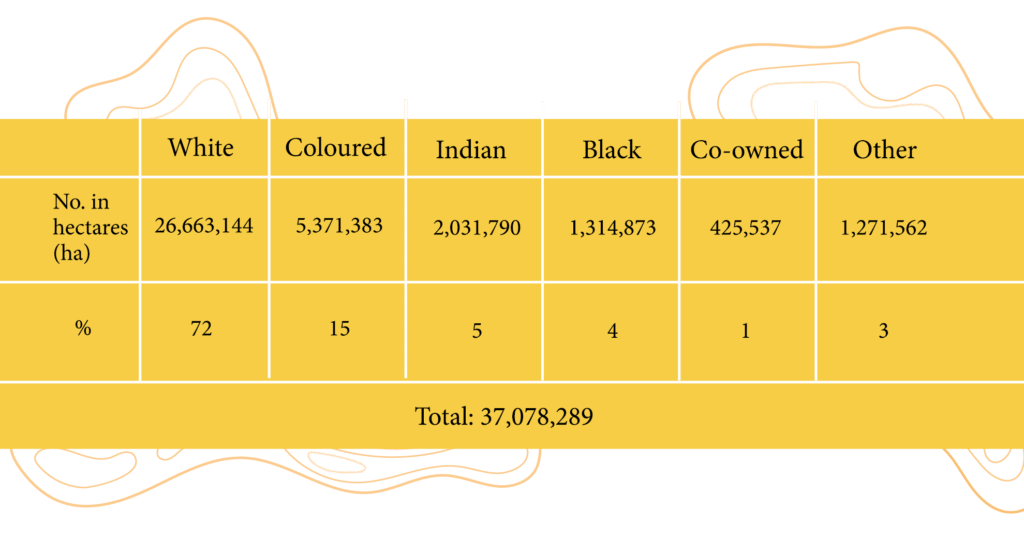
It is worth noting that the gender inequities on South African farms are in line with continental and global trends. Zakithi Sibandze of the Swaziland Rural Women’s Assembly describes how, in order to have access to land, women in rural Swaziland must either be married to a man or have a son or brother in whose name the land must be registered. Similarly, in Kenya, as Perpetua Wambui Karanja writes, ‘Women’s economic well-being has continued to depend largely on their rights in marriage, divorce and inheritance, and their rights to land ownership as an instrument of social and economic transformation has increasingly been neglected’.22
In the Northern and Western Cape of South Africa, many women are seasonal workers employed in vineyards and orchards during the harvest, generally for six months at a time. This causes both job and food insecurity for many of the women farmworkers and, consequently, for their entire families. MamNywabe, a farmworker from Nyarha, in the Eastern Cape, explains how gender inequality exists even when women are permanently employed: ‘At my workplace, we get treated differently as women because, even if something concerns us, it only gets discussed and concluded by the men but when it comes to us, we know nothing about it’.23 At the household level, women are also largely responsible for facilitating the social reproduction of the family in the form of unpaid care work in addition to farm work. The men, meanwhile, are more often employed on a long-term or permanent basis and secure better paying jobs as foremen, supervisors, and bakkie (‘pick-up truck’) drivers.
Given this reality, when discussing the agrarian question in South Africa, it is essential to address the gender inequities in land ownership and the career progression for women farmworkers, as well as the invisible work that women undertake in their households.
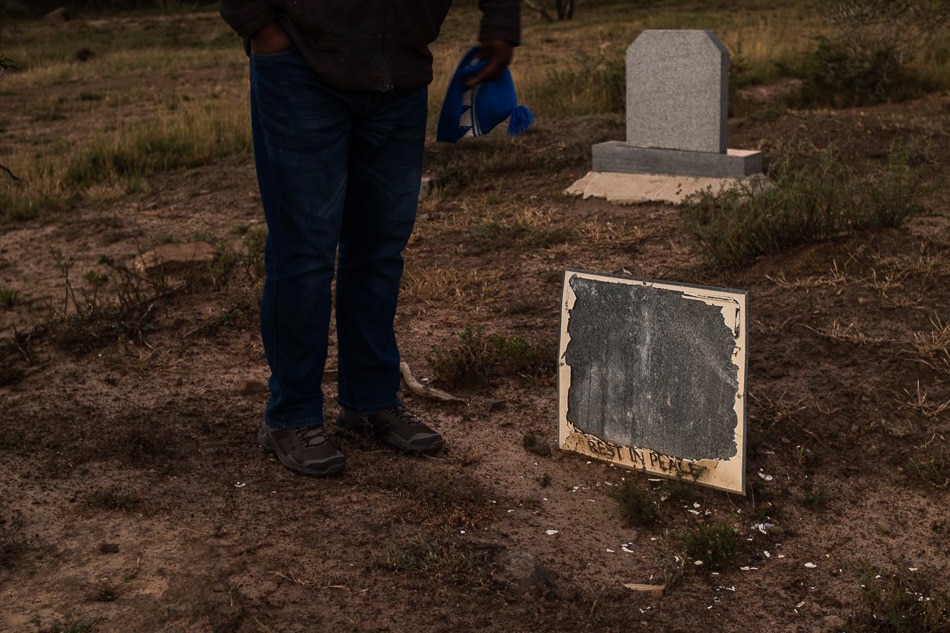
The graves of Black people are proof of the labour of generations of their families on South African farms. This is the site of the ancestral graveyard of the Phyllis family on which Yvonne’s father Jacob and his family worked, 6 June 2021. (Photo: New Frame / Andy Mkosi)
Umhlaba wookhokho Bethu! The Land of Our Ancestors!
‘Nature did not produce property-less labourers on the one side and owners of property on the other’.24
– Issa G. Shivji
Farmworkers relate to the land with a sense of belonging and cultural heritage, often referring to it as umhlaba wookhokho bethu (‘the land of our ancestors’). This phrase has multiple meanings in the context of farming communities. Not only do they think of the land of their ancestors through a historical lens; they also conceive of it as an unresolved question of injustice, understanding it to be deeply rooted in history and in generations of exploitation by white farm owners – a history that continues to the present day. Farmworkers see the land as being stolen from their forefathers through the process of colonial dispossession and deception that advanced the development of capitalism. In their articulation, this not only led to the loss of land and livestock, but also a disruption of pre-colonial African conceptions of land relations and land use. The understanding of the land as a commons–that it can be held communally–was largely destroyed.
As we know, primitive accumulation was a crucial component of colonial rule in Africa. Farmworkers are critical of the white minority’s illegitimate acquisition of land and argue that it is the root of racial inequality. In countries that experienced the tragedy of settler colonialism, Shivji explains how massive amounts of land were alienated and how these countries experienced initial processes of land grabbing.25 He refers to this as ‘primitive accumulation par excellence’, the original process by which the conditions of capitalist accumulation were created.26 This process also produced a ‘surplus population’ of landless people who held neither formal nor customary rights, leading to the proletarianisation of a large sector of the population. This created a set of people who had nothing to use for subsistence and reproduction except for their own energy and muscle power.
Over time, agricultural land ownership has become even more racialised. The acquisition of land is a costly process that is more easily afforded by white people who have the generational wealth and resources to purchase land. The wealth that farmers gain from the land in turn allows them to acquire more land and make further investments on their existing property. Farmworkers, by comparison, have no share in this prosperity. They create wealth for the white farm owners while remaining impoverished, and their children inherit their parents’ poverty. This is how the wealth gap becomes more entrenched, as expressed by the fact that the richest 1 per cent of South Africans hold roughly 40.8 per cent of the country’s total wealth while the bottom 90 per cent hold a 20.1 per cent share.27
Emerging from the historical processes of radicalised dispossession, land ownership and enrichment from it have enormous implications for power relations in which farm owners continue to have far more rights than the workers over whom they exercise control. As Carmen Louw of the feminist initiative Women on Farms Project explains, ‘The farms in the Western Cape stem from colonial times. The people working on the farms today are descendants of the slaves that started these farms and, therefore, they have a right to land redistribution’.28 It is clear that farmworkers do not view their historical dispossession as separate from the current land and labour struggles.29
On the most basic level, farmworkers are concerned about securing their own housing and shelter to make better lives for themselves, their families, and future generations. Oom Boetman, a farmworker who specialises in agricultural fencing in Colesberg, in the Northern Cape, explains: ‘Ons soek beter bly plek, dan sal ons ook beter lewe’(‘We want better housing so that we too may live better lives’).30 Similarly, Tanie Leana, a farm dweller in the same province who has six children and one grandson, wishes that the government would develop their community. ‘Ons soek net huise’ (‘We just want houses’), her daughter says.31
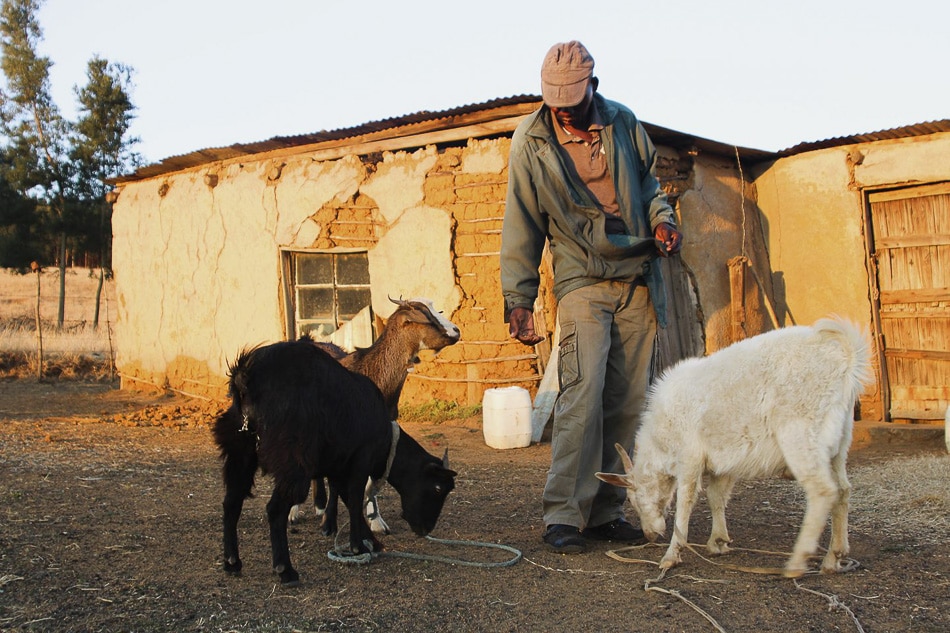
Keeping livestock, ukulima (‘crop farming’), and ukufuya (‘animal husbandry’) are sources of survival for farmworkers like Ephraim Muggibelo Simelane, 30 July 2020. (Photo: New Frame / Magnificent Mndebele)
Generational Labour
‘We will never address the dignity of farmworkers if we don’t get the land.
The land question is non-negotiable!’
– Trevor Christians, secretary-general of the Commercial, Stevedoring, Agricultural, and Allied Workers’ Union (CSAAWU)
Though the Freedom Charter promises that ‘the land shall be shared among those who work it’, and section 25 (5) of the Constitution of South Africa promises equitable access to land, these promises have yet to be fulfilled. Several generations of landless farmworker families have used their labour in service of the productivity and maintenance of farms across the country. In the process, they have contributed immensely to the generational wealth of farm owners. Farmworkers tie this process to the labour struggles of their forefathers; long-term generational labour on farms should be considered a sufficient reason not only to justify farmworkers’ tenure, but also to claim land ownership.
Farmworkers Baw’uSukwini and Baw’uMkwayi both touch on this point. A fifth-generation farmworker, Baw’uSukwini, talks about the case of his family on a livestock farm in Nyarha, in the Eastern Cape:
I think that my dad is the fourth generation on that farm … My dad was over 80 years old when he died. My dad never went to school; he was born [on the farm and] … he grew up there and worked there. He reached old age and died there. All eight of us siblings … grew up on that farm and we worked on that farm … farmworkers are the ones who have worked that land until their hair turns grey. Why is it that the government doesn’t buy a farm? After buying the farm, they could go around the farms looking for people who are living on the [white-owned] farms. The government could indicate that a farm has been bought for them to live on so that they wouldn’t have to go to the township.32
Baw’uMkwayi, a retired farmworker on another livestock farm in Nyarha, in the Eastern Cape, shares her story:
all of them [my family] worked on the farm … I also worked there for 20 years … [and] my wife also worked on that farm … for 20 years in the kitchen at the farm owner’s compound. When we left, she too got nothing; she left empty handed.3
Most farmworkers have no formal employment contracts or benefits. As Baw’uMkwayi and Baw’uSukwini describe, it is common for workers to end up with no pension or way to support themselves in old age, making them reliant on younger generations. In this way, the cycle of labour is perpetuated as younger people work on farms to support dependents of various ages.
Ryno Filander, president of the CSAAWU, a farmworker’s union in the Western Cape, shared that he, his father, and his mother all work on the same wine farm in Langeberg. He explores two parallels on the farm: the multi-generational wealth and power of farm owners and the multi-generational poverty and powerlessness of farmworkers. ‘If you have land, you have power’, he says. The other problem, Ryno explains, is the ‘dop system’.34 With the dop system, employers pay their employees with cheap wine, or dop. Though the dop system was outlawed in South Africa in the 1960s, in the late 1990s researchers estimated that anywhere from 2 per cent to 20 per cent of wages in the Western Cape were still being issued in alcohol.35 Alcoholism remains one of the major challenges facing public health across South Africa–particularly in the Western Cape.
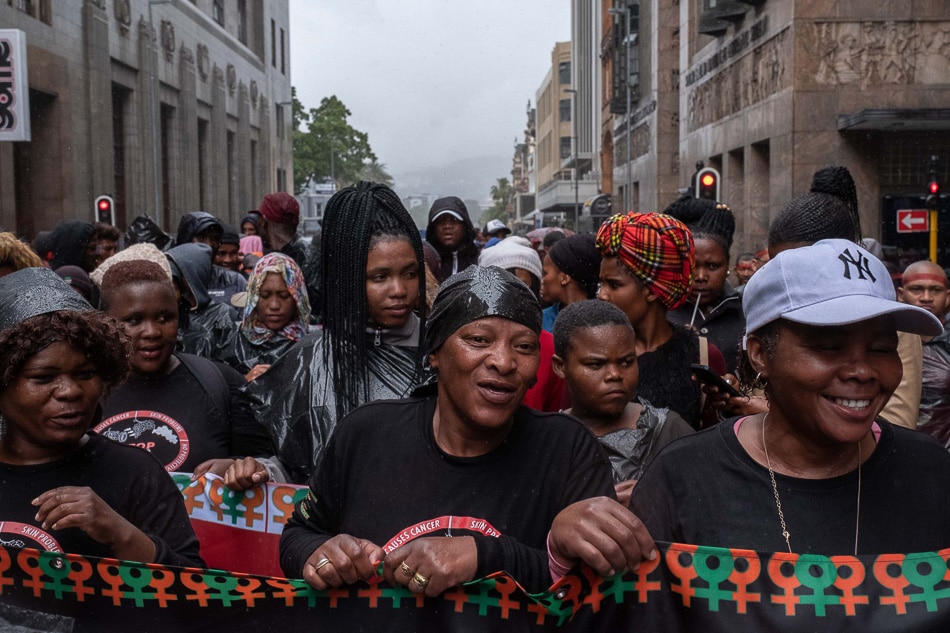
Members of the Commercial, Stevedoring, Agricultural, and Allied Workers’ Union (CSAAWU) protest in Cape Town against poor working and living conditions on farms, 21 September 2019. (Photo: New Frame / Barry Christianson)
Grave Matters
Farms have also become places of great spiritual significance for farmworkers whose ancestors were buried on that land. For farmworkers, their ancestors’ graves are in many instances proof of the intimacy between work and life on the farms. The concepts of home and belonging are also influenced by the ancestral connection between the living kunye nezinyanya (‘and ancestors’). This is one of the main reasons why families live on farms for years despite exploitation and abuse. As MaNkomo, a farmworker we spoke to in Mooi River, KwaZulu-Natal, explained, ‘We don’t want to leave these farms because our parents and grandparents are buried here’.36
The loss of the ‘intangible’–the vital spiritual connection between the living and the dead–is a significant consideration if we are to ensure restorative reparation and justice for farmworkers. Dineo Skosana’s work examines protests against the relocation of 1,000 African graves from Tweefontein Farm in Ogies, Mpumalanga to a new site, leading living descendants to report feeling ‘spiritually vulnerable and disconnected from their ancestors’.37 By examining this phenomenon, Skosana highlights the failures of post-apartheid objectives to remedy past injustices. She argues that inadequacies in the legal system have created the conditions for market-friendly laws, such as the Mineral and Petroleum Resources Development Act (2002), to override the protection of heritage enshrined in The National Heritage Resource Act (1999), resulting in new forms of exclusion.38
Currently, land governance does not take cultural or historical aspects into consideration and continues to reproduce pain and trauma for the landless. This contributes to the dismal failure of the land reform programme that is currently being implemented by the state. Farmworkers see ancestral graves as both proof of labour and a political claim–that scores of people buried on farms were once labour tenants and exploited workers who ensured the farm’s flourishing. These graves are a testimony to the lives of those who bore the brunt of racial capitalism. Bhut’Ben, a second-generation farmworker in Mooi River, KwaZulu-Natal spoke to this point more broadly: ‘Umphakathi wa-la awukho esimeni esi-right ngokwe nkululeko, kuthiwa sisenkululekweni. Cha as’kabi khona thina. Sisagqilazekile’ (‘The community here has not experienced freedom. We are said to have freedom but no, we have not yet achieved it here. We are still in slavery’).39
Addressing Food Insecurity
A report produced by the Food and Agriculture Organisation of the United Nations shows that food insecurity is already a global crisis, meaning that people do not have, ‘at all times, … physical and economic access to sufficient, safe and nutritious food that meets their dietary needs and food preferences for an active and healthy life’.40 This report estimates that, in 2020, anywhere from 720 to 811 million people across the globe faced hunger while one in three (2.37 billion) lacked adequate food access.41
Despite the fact that farmworkers in South Africa – and around the world – provide food for society, they are one of the groups most vulnerable to food insecurity.42 What we eat, drink, and wear is all thanks to farmworkers. Though their skills and expertise are crucial to the economy, their labour continues to be devalued. Seasonal farmworkers (usually women) who are often employed for only half the year regularly face the challenge of job insecurity given that they do not have access to their own land to produce food year-round. Climate change has also rendered farming an increasingly precarious field, mainly for frontline and low-income communities around the world.
One of the main critiques presented to argue against the redistribution of land is the dangerous myth that it will negatively affect food security. This myth not only disregards the fact that billions of people around the world already experience food insecurity, but also relies on large-scale production and manufacturing under capitalism as the only path forward. Rather than centring a concern to guarantee food security for all, capitalist paranoia fixates on its fear that redistributing land will disrupt profit revenues generated by large-scale farming and food production. While some farmworkers, mainly the elderly, are asking for the recognition of peasant landholdings, where small landholders survive from and produce on the land, ukulima (‘crop farming’) and ukufuya (‘animal husbandry’) are not limited to familial subsistence.43 Generally, farmworkers are critical of the myth that white farmers are the only ones capable of farming with superior technology and are the only efficient producers, while Black farmers only farm for subsistence and contribute minimally to the economy.44
A genuine concern for food security would take into account other means of producing food, such as growing crops ukusiphilisa (‘for our livelihoods’). Along these lines, the idea of food sovereignty was developed in the 1990s to advocate for ‘the right of peoples to healthy and culturally appropriate food produced through sustainable methods and their right to define their own food and agriculture systems’.45 Prioritising food sovereignty is an alternative way of organising our food system that gives those who work the land a say in how the agricultural industry is organised and what its productive priorities should be.
However, food sovereignty and ukusiphilisa – alongside farmworkers’ relations to land–are disregarded by the capitalist solution to food production. Farmworkers’ land aspirations are greater than producing food for themselves and their families; they see themselves as farmers in their own right, as workers of the land, as producers of food, and as farmers of livestock, and they strongly believe in their ability to contribute substantially to domestic and continental markets. An effective land redistribution programme must support their ambition.
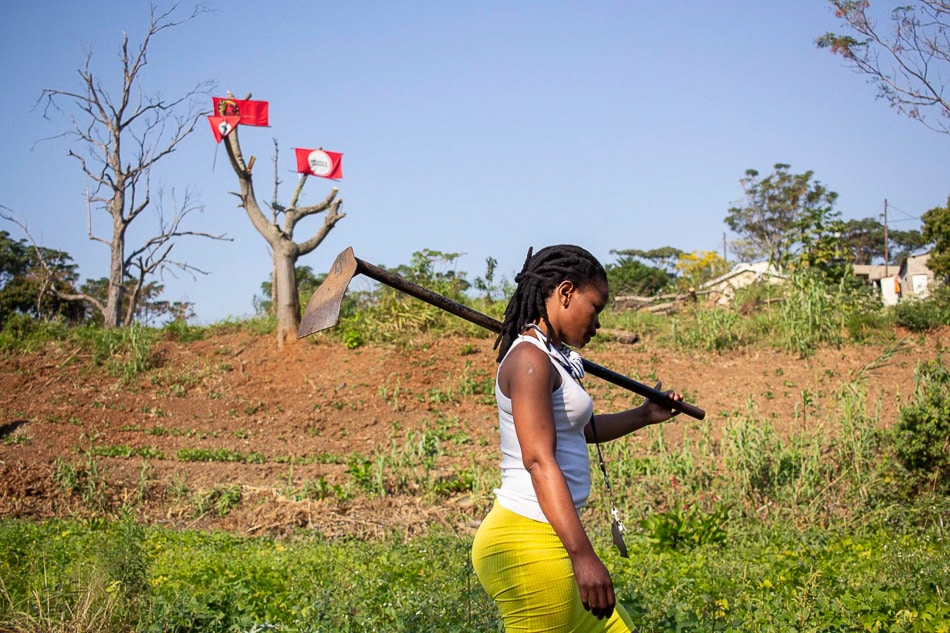
Sbongile Tabhethe works in the food garden at eKhenana, a settlement supported by the shack dwellers’ movement Abahlali baseMjondolo in Cato Manor, Durban, 9 June 2020.
(Photo: New Frame / Mlungisi Mbele)
Conclusion
Land reform in South Africa has failed miserably at addressing the injustices of colonialism and apartheid. Post-apartheid governments have adopted a market-oriented approach to land redistribution by prioritising the willing-seller, willing-buyer model, which has only deepened inequality. The beneficiaries of land are still elites and large agricultural corporations who can access bank loans. Land reform as it stands has not led to restorative justice, nor has it solved the problem of land hunger amongst the masses or among the Black farmworkers who have built up the wealth of farm owners for generations.
Land redistribution is an urgent need to remedy ‘historical wrongs’ and address existing social and economic inequities in order to secure an egalitarian future for all.46 Today in South Africa, farmworkers live under the most dehumanising conditions. In all of the country’s nine provinces, they regularly face eviction despite the existence of laws such as the Extension of Security of Tenure Act 62 of 1997, which is intended to prevent displacement. In cases where farm dwellers resist eviction, landowners have been known to cut off basic services like water and electricity in an effort to push them off the farms. Labour and living conditions on farms are appalling, and the people who live and work there have limited access to education and healthcare services, keeping them trapped in poverty.
Descendants of the forgotten workers from centuries past call for reparation. A land redistribution discussion which deliberately ignores African modes of being and relationality to land upholds the colonial project and portends dehumanising exclusion. Any land redistribution programme which ignores these claims is insufficient.
The following demands from farmworkers and farm dwellers are key components of an effective land reform programme:
- The government of South Africa must consult farmworkers and farm dwellers to incorporate their contributions into the development of a land reform programme which addresses their land needs.
- Labour tenants’ claims to land ownership should be given priority in order to avoid land reform that solely enriches Black elites.
- The Department of Agriculture, Land Reform and Rural Development should facilitate the process of white farm owners apportioning some of their farmland to lifetime employees and descendants of families who have worked on farms for several generations.
- The government must purchase farms for farmworkers and assist them with capital for start-up costs, farming equipment, and agricultural skills.
- Land reform in South Africa must take into account the social factors that contribute to food insecurity and acknowledge the opportunities to rectify it through land redistribution.
- The process of land reform must address the marginalisation of women workers in the agricultural industry and the lack of land ownership by women farmers to ensure gender parity in both spheres.
Loo ngumhlaba wookhokho bethu! This is the land of our ancestors! Land to those who work it; it is high time that those who work the land get to own the land.
Bibliography
Adams, Martin, Sipho Sibanda, and Stephen Turner. ‘Land Tenure Reform and Rural Livelihoods in Southern Africa’. Natural Resource Perspectives, no. 39 (February 1999): 1–15.
Amanor, Kojo S. ‘Land Governance in Africa: How Historical Context Has Shaped Key Contemporary Issues Relating to Policy on Land’. In Framing the Debate Series, no. 1. Rome: International Land Coalition, 2012.
Association for Rural Advancement (AFRA). The Investigation of the Effects of Conservation and Tourism on Land Tenure and Ownership Patterns in KwaZulu-Natal. Pietermaritzburg: AFRA, 2004.
Atkinson, Doreen. Going for Broke: The Fate of Farm Workers in Arid South Africa. Cape Town: Human Sciences Research Council Press, 2007.
Bab’Kubheka. Interview and translation by Yvonne Phyllis. Newcastle, KwaZulu-Natal, 23 October 2021.
Bhut’Ben. Interview and translation by Yvonne Phyllis. Mooi River, KwaZulu-Natal, 24 October 2021.
Bhattacharya, Tithi. ‘Mapping Social Reproduction Theory’. Verso Books Blog, 15 February 2018. www.versobooks.com
Baucom, Ian. ‘Specters of the Atlantic’. The South Atlantic Quarterly 100, no. 1 (2001): 61–82.
Baw’uMkwayi. Interview and translation by Yvonne Phyllis. Nyarha, Eastern Cape, 5 June 2021.
Baw’uSukwini. Interview and translation by Yvonne Phyllis. Nyarha, Eastern Cape, 5 June 2021.
Carmen Louw. Interview and translation by Yvonne Phyllis. Stellenbosch, Western Cape 14 March 2022.
Credit Suisse Research Institute. Global Wealth Report 2021. June 2021. www.credit-suisse.com
Cross, Catherine and Michelle Friedman. ‘Women and Tenure: Marginality and the Left-hand Power’. In Women, Land, and Authority: Perspectives from South Africa, edited by Shamim Meer, 17–34. Cape Town: David Philip, 1997.
Davies, Wendy. We Cry for Our Land: Farm Workers in South Africa. Oxford: Oxfam, 1990.
Department of Rural Development and Land Reform, Republic of South Africa. Land Audit Report, Version 2: Private Land Ownership by Race, Gender, and Nationality. Department of Rural Development and Land Reform, November 2017.
Devereux, Stephen, Ruth Hall, and Colette Solomon. ‘The Farm Workers Who Produce Our Food Are the Most Vulnerable to Hunger’. Mail & Guardian, 8 October 2019. mg.co.za
Du Toit, Andries. ‘Farm Workers and the “Agrarian Question”’. Review of African Political Economy 21, no. 61 (1994): 375–388.
Food and Agriculture Organisation of the United Nations (FAO), International Fund for Agricultural Development, United Nations International Children’s Emergency Fund, World Food Programme, and World Health Organisation. The State of Food Security and Nutrition in the World 2021: Transforming Food Systems for Food Security, Improved Nutrition, and Affordable Healthy Diets for All. Rome: FAO, 2021.
Food and Agriculture Organisation of the United Nations. ‘Food Security’. Policy Brief, no. 2 (2006): 1–4.
Hornby, Donna and Stha Yeni. ‘Farm Dwellers in Kwa-Zulu Natal South Africa and the Politics of Home’. Conference Paper no. 74 presented at the Emancipatory Rural Politics Initiative Conference, 2018.
Karanja, Perpetua W. ‘Women’s Land Ownership Rights in Kenya’. Third World Legal Studies 10, article 6 (1991): 109–135.
Leana, Tanie. Interview and translation by Yvonne Phyllis. Colesberg, Northern Cape, 6 February 2022.
London, Leslie. ‘The “Dop” System, Alcohol Abuse, and Social Control Amongst Farm Workers in South Africa: A Public Health Challenge’. Social Science & Medicine 48, no. 10 (1999): 1407–1414.
Mafeje, Archibald B. The Agrarian Question, Access to Land, and Peasant Responses in sub-Saharan Africa. Geneva: United Nations Research Institute for Social Development, 2003.
MamNteshi. Interview and translation by Yvonne Phyllis. Newcastle, KwaZulu-Natal, 23 October 2021.
MaNkomo. Interview and translation by Yvonne Phyllis. Mooi River, KwaZulu-Natal, 24 October 2021.
MamNywabe. Interview and translation by Yvonne Phyllis. Nyarha, Eastern Cape, 6 June 2021.
Mkhize, Naledi N. ‘Private Game Farms and the Tenure Security of Workers and Dwellers in Cradock–Implications for Tenure Reform in South Africa’. PhD diss., University of Cape, 2012.
Moore, Melissa. ‘SA’s Agriculture Sector–A Key Driver of Economic Growth’. Future Growth, 31 May 2021. www.futuregrowth.co.za
Moyo, Sam. ‘The Politics of Land Distribution and Race Relations in Southern Africa’. Identities, Conflict, and Cohesion Programme Paper no. 10, United Nations Research Institute for Social Development, 2004.
Neocosmos, Michael. The Agrarian Question in Africa and the Concept of ‘Accumulation from Below’: Economics and Politics in the Struggle for Democracy (Research Report). Vol. 93. Nordic Africa Institute, 1993.
Ngcukaitobi, Tembeka. ‘Part Two: Land Matters and Historical Distortions’. Interview by Yvonne Phyllis. New Frame, 7 July 2021. www.newframe.com
Ngcukaitobi, Tembeka. ‘Rethinking the Past and Future of Land Reform’. New Frame, 19 November 2019. www.newframe.com
Oom Boetman. Interview by Yvonne Phyllis. Colesburg, Northern Cape, 6 February 2022.
Ossome, Lyn and Sirisha C. Naidu. ‘Social Reproduction and the Agrarian Question of Women’s Labour in India’. Agrarian South: Journal of Political Economy 5, no. 1 (2016): 50–76.
Ossome, Lyn. ‘Episode 8: Social Reproduction, Capitalist Exploitation and Surplus the Population’. 15 October 2021, in Institute for Poverty, Land and Agrarian Studies (PLAAS) Podcast, audio, 39:35. www.plaas.org.za
Ossome, Lyn, and Sirisha C. Naidu. ‘The Agrarian Question of Gendered Labour’. In Labour Questions in the Global South, edited by Praveen Jha, Walter Chambati, and Lyn Ossome, 63–86. Singapore: Palgrave Macmillan, 2021.
Patel, Raj. ‘Climate, Conflict and Capitalism Drive Global Hunger. COVID Made It Worse’. Democracy Now, 23 September 2021. www.democracynow.org
Rodney, Walter. How Europe Underdeveloped Africa. London: Verso Books, 2018.
Ryno Filander. Interview and translation by Yvonne Phyllis. Bellville, Western Cape, 26 July 2021.
Shivji, Issa G. Accumulation in an African Periphery: A Theoretical Framework. Dar es Salaam: Mkuki na Nyota Publishers, 2009.
Shivji, Issa G. ‘Commodification of the Commons in the Transition to Neo-Liberalism: The Case of Tanzania’. Online lecture in The Political Economy of Land Governance in Africa seminars, Network of Excellence for Land Governance in Africa, 9 September 2021.
Shivji, Issa G. ‘Let a Hundred Socialist Flowers Bloom: A Conversation with Issa Shivji’. Interview by Freedom Mazwi. Review of African Political Economy, 11 November 2021. roape.net
Shivji, Issa G. ‘Sam Moyo and Samir Amin on the Peasant Question’. Agrarian South: Journal of Political Economy 8, no. 1–2 (2019): 287–302.
Shivji, Issa G. ‘Trajectories of Accumulation: How Neoliberal Primitive Accumulation is Planting the Seeds of Suicide’. New Agenda: South African Journal of Social and Economic Policy, no. 68 (2018): 36–38.
Skosana, Dineo. ‘Grave Matters: The Contentious Politics of Gravesite Removals in Contemporary South Africa–The Case of Tweefontein, Ogies’. PhD diss., University of Witwatersrand, 2019.
Skosana, Dineo. ‘Mining Activities Continue to Dispossess Black Families in South Africa’. Bizcommunity, 12 November 2019. www.bizcommunity.com
Statistics South Africa. ‘Stats SA Releases Census of Commercial Agriculture 2017 Report’. Stats SA, 24 March 2020. www.statssa.gov.za
Endnotes:
- ↩ This dossier is written in the first person by the author, Yvonne Phyllis, a descendant of farmworkers. The use of the first person has been retained to reflect the intimate nature of politics surrounding the issue of land in South Africa.
- ↩ Andries du Toit, ‘Farm Workers and the “Agrarian Question”’, Review of African Political Economy, no. 61 (1994): 375.
- ↩ Tithi Bhattacharya, ‘Mapping Social Reproduction Theory’, Verso Books Blog, 15 February 2018, www.versobooks.com
- ↩ Bab’Kubheka speaks in plural when referring to fathers, forefathers, or ancestors because he understands his family’s struggles to be part of the class struggle of all Black farmworkers, farm dwellers, and labour tenants. This way of speaking is common in many African cultures.
- ↩ Bab’Kubheka, interview and translation by Yvonne Phyllis, Newcastle, KwaZulu-Natal, 23 October 2021.
- ↩ Walter Rodney, How Europe Underdeveloped Africa (London: Verso Books, 2018), 271.
- ↩ For more on this topic, see Tembeka Ngcukaitobi, ‘Part Two: Land Matters and Historical Distortions’, interviewed by Yvonne Phyllis, New Frame, 7 July 2021.
- ↩ Ian Baucom, ‘Specters of the Atlantic’, The South Atlantic Quarterly 100, no. 1 (2001): 61–82.
- ↩ Wendy Davis, We Cry for Our Land: Farm Workers in South Africa (London: Oxfam, 1990), 1.
- ↩ Davies, We Cry for Our Land, 1.
- ↩ Davies, We Cry for Our Land, 1.
- ↩ Davies, We Cry for Our Land, 1.
- ↩ Davies, We Cry for Our Land, 1.
- ↩ Davies, We Cry for Our Land, 1.
- ↩ Davies, We Cry for Our Land, 1.
- ↩ Davies, We Cry for Our Land, 1.
- ↩ Issa G. Shivji, ‘Trajectories of Accumulation: How Neoliberal Primitive Accumulation is Planting the Seeds of Suicide’, New Agenda: South African Journal of Social and Economic Policy, no. 68 (2018): 36.
- ↩ Credit Suisse Research Institute, Global Wealth Report 2021.
- ↩ Statistics South Africa, ‘Stats SA Releases Census of Commercial Agriculture 2017 Report,’ Stats SA, 24 March 2020, www.statssa.gov.za
- ↩ Department of Rural Development and Land Reform, Republic of South Africa, Land Audit Report, Version 2: Private Land Ownership by Race, Gender, and Nationality, Department of Rural Development and Land Reform, November 2017.
- ↩ In the 1950s, the apartheid government divided South Africans into four racial groups: white, native (or Black), Indian, and Coloured (mixed-race people).
These racial and cultural descriptors are no longer legislated as they were during the apartheid years but are still in common use today. For more on race and ethnicity in South Africa, see South African History Online, ‘Race and Ethnicity in South Africa’, 27 August 2019, www.sahistory.org.za - ↩ Perpetua Wambui Karanja, ‘Women’s Land Ownership Rights in Kenya’, Third World Legal Studies 10, article 6 (1991): 109.
- ↩ MamNywabe, interview and translation by Yvonne Phyllis, Nyarha, Eastern Cape, 6 June 2021.
- ↩ Issa G. Shivji, Accumulation in an African Periphery: A Theoretical Framework (Dar es Salaam: Mkuki na Nyota Publishers, 2009), 26.
- ↩ Issa G. Shivji, ‘Commodification of the Commons in the Transition to Neo-Liberalism: The Case of Tanzania’, (Online lecture in The Political Economy of Land Governance in Africa seminars, Network of Excellence for Land Governance in Africa, 9 September 2021).
- ↩ Shivji, ‘Commodification of the Commons in the Transition to Neo-Liberalism’, 2021.
- ↩ Credit Suisse Research Institute, Global Wealth Report 2021.
- ↩ Carmen Louw, interview and translation by Yvonne Phyllis, Stellenbosch, Western Cape, 14 March 2022.
- ↩ Moyo, ‘The politics of land distribution’, 2.
- ↩ Oom Boetman, interview by Yvonne Phyllis, Colesberg, Northern Cape, 6 February 2022.
- ↩ Tanie Leana, interview and translation by Yvonne Phyllis, Colesberg, Northern Cape, 6 February 2022.
- ↩ Baw’uSukwini, interview and translation by Yvonne Phyllis, Nyarha, Eastern Cape, 5 June 2021.
- ↩ Baw’uMkwayi, interview and translation by Yvonne Phyllis, Nyarha, Eastern Cape, 5 June 2021.
- ↩ Ryno Filander, interview by Yvonne Phyllis, Bellville, Western Cape, 26 July 2021.
- ↩ Leslie London, ‘The “Dop” System, Alcohol Abuse and Social Control Amongst Farmworkers in South Africa: A Public Health Challenge’, Social Science & Medicine 48, no. 10 (1999): 1407–1414.
- ↩ MaNkomo, interview and translation by Yvonne Phyllis, Mooi River, KwaZulu-Natal, 24 October 2021.
- ↩ Dineo Skosana, ‘Mining Activities Continue to Dispossess Black Families in South Africa’, Bizcommunity, 12 November 2019, www.bizcommunity.com
- ↩ Dineo Skosana, ‘Grave Matters: The Contentious Politics of Gravesite Removals in Contemporary South Africa–The Case of Tweefontein, Ogies’, (PhD diss., University of Witwatersrand, 2019).
- ↩ Bhut’Ben, interview and translation by Yvonne Phyllis, Mooi River, KwaZulu-Natal, 24 October 2021.
- ↩ FAO, International Fund for Agricultural Development, United Nations International Children’s Emergency Fund, World Food Programme and World Health Organisation, The State of Food Security and Nutrition in the World 2021, 2021.
- ↩ FAO, The State of Food Security and Nutrition in the World 2021, 2021.
- ↩ Stephen Devereux, Ruth Hall, and Colette Solomon, ‘The Farm Workers Who Produce Our Food Are the Most Vulnerable to Hunger’, Mail & Guardian, 8 October 2019, mg.co.za
- ↩ Review of African Political Economy (ROAPE), ‘Let a Hundred Socialist Flowers Bloom: A Conversation with Issa Shivji’, ROAPE, 11 November 2021, roape.net
- ↩ Moyo, ‘The Politics of Land Distribution’, 2.
- ↩ Tricontinental: Institute for Social Research, ‘A World Without Hunger: The Fortieth Newsletter (2021)’, October 2021, https://thetricontinental.org/newsletterissue/40-a-world-without-hunger/.
- ↩ Tembeka Ngcukaitobi, ‘Rethinking the Past and Future of Land Reform’, New Frame, 19 November 2019, www.newframe.com

